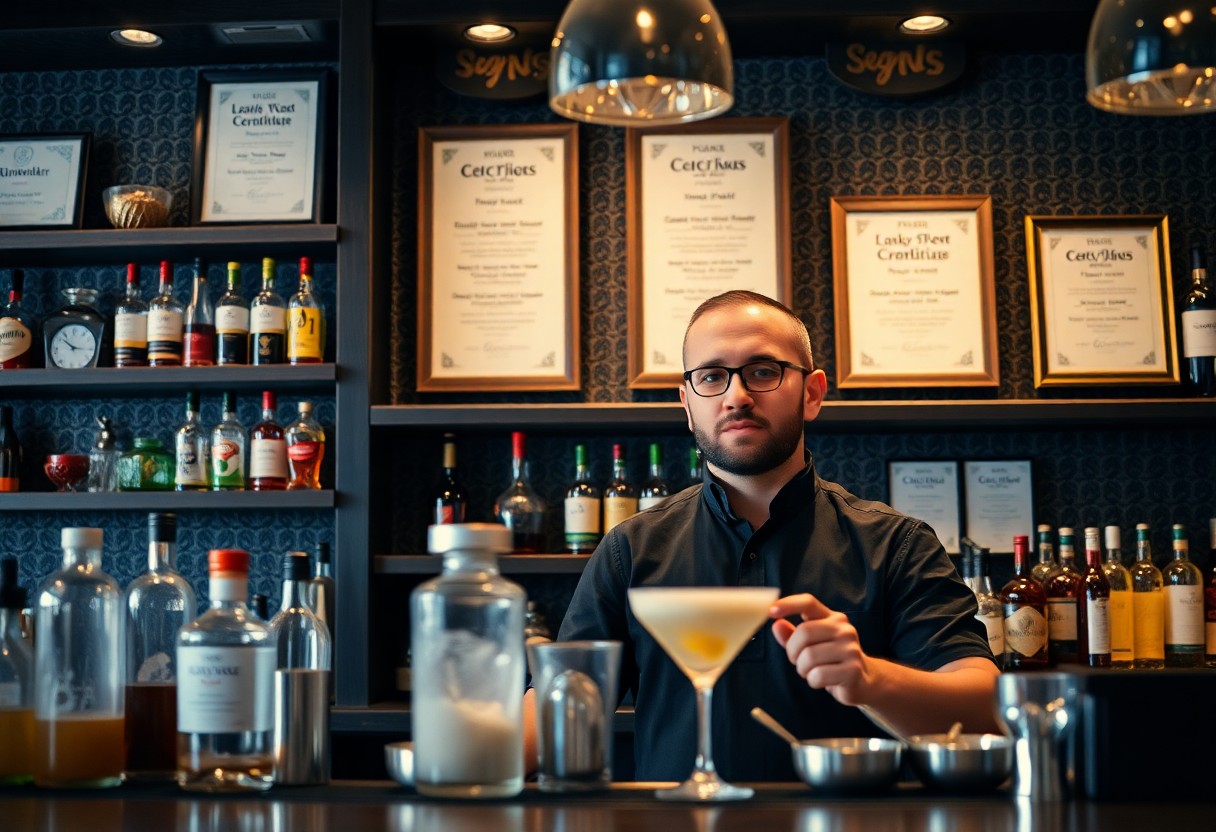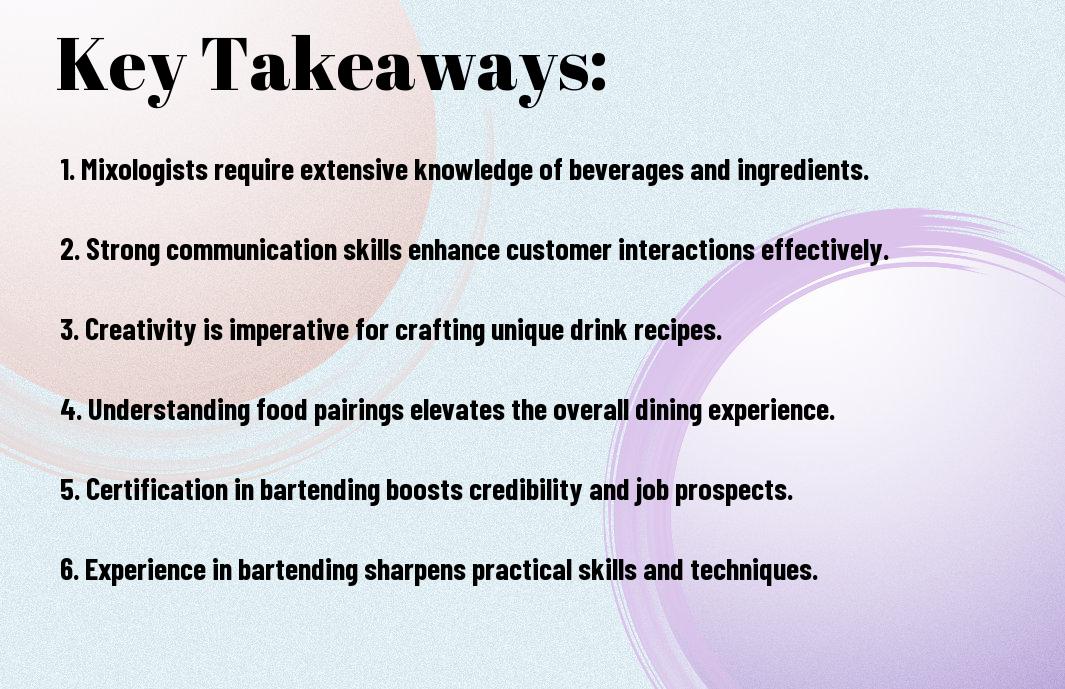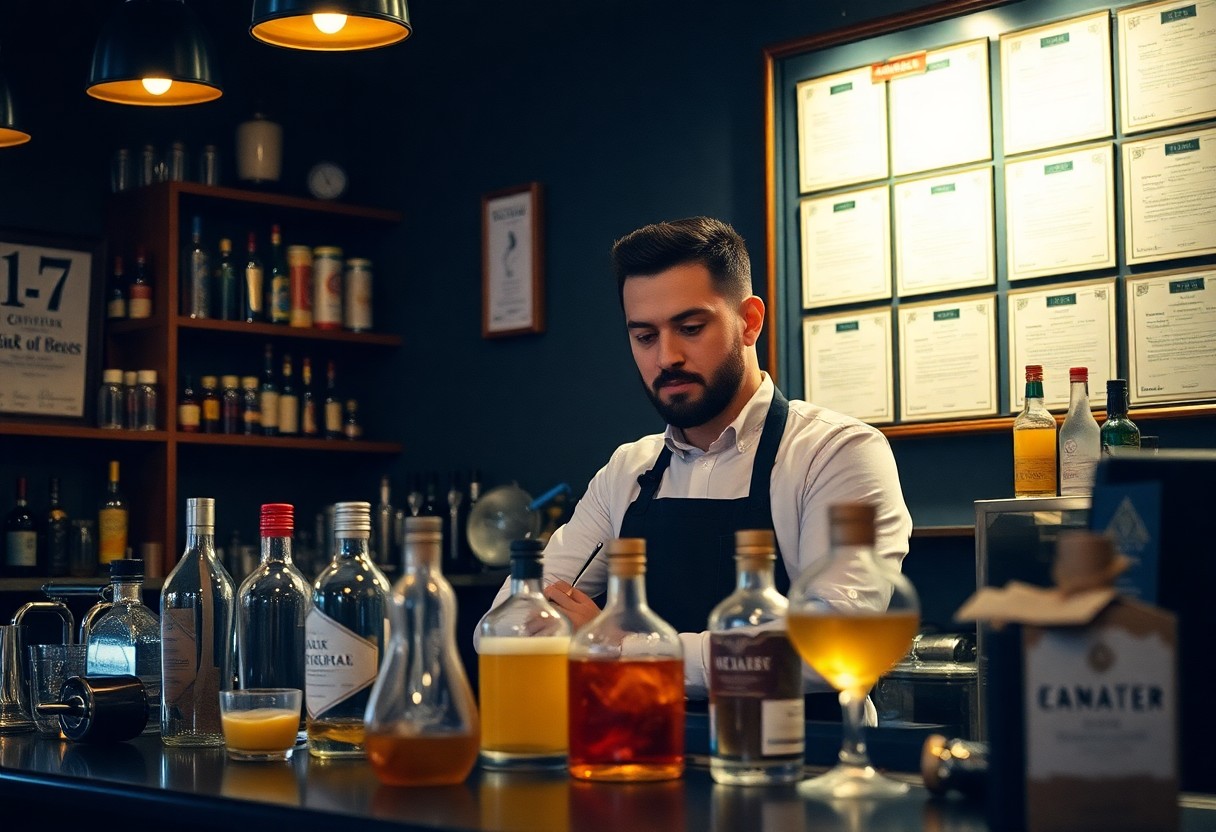Qualifications for becoming a successful mixologist encompass a range of crucial skills and certifications that enhance your beverage-making prowess. You need a deep understanding of flavor combinations, a knack for creativity, and the ability to handle high-pressure situations in a fast-paced environment. Alongside practical experience, obtaining a formal certification can significantly boost your credibility and employability. In this post, we will explore the vital skills and qualifications needed to excel in this exciting and dynamic field.

Key Takeaways:
- Mixologists typically need a combination of formal education, like bartending school, and practical experience to master cocktail crafting techniques and understand flavor profiles.
- Certification is often beneficial, with options such as the Certified Specialist of Spirits (CSS) or Certified Bartender credentials, which can enhance a mixologist’s credibility and knowledge.
- Essential skills include creativity in drink creation, knowledge of various spirits and liqueurs, strong customer service abilities, and effective communication skills to engage with patrons.

What is a Mixologist?
Your exploration of the beverage world leads you to the fascinating role of a mixologist. A mixologist is a skilled bar professional who specializes in creating unique and innovative cocktails, often elevating the drinking experience through in-depth knowledge of spirits, flavors, and presentation techniques. This craft goes beyond simply pouring drinks; it blends art, science, and interpersonal skills to craft memorable libations that cater to your tastes.
Definition and Role
Among the many culinary artisans, a mixologist stands out by combining creativity with technique to design exceptional cocktails. They are not just bartenders; they are inventory connoisseurs who understand the nuances of ingredients and can craft intricate flavor profiles that elevate your enjoyment of beverages, providing a tailored experience.
Difference Between Bartenders and Mixologists
Against the common misconception, bartenders and mixologists are not interchangeable terms. While both serve drinks, the primary difference lies in the level of expertise and creativity involved. Bartenders typically focus on serving drinks quickly and efficiently, while mixologists take the time to curate and invent recipes that showcase a broader understanding of mixology and flavor pairing.
In addition to the basic functions of serving drinks, a mixologist often possesses a deeper appreciation for the craft of cocktail-making, engaging in ongoing experimentation and continuing education. Their role is highly collaborative, as they often interact with customers to tailor drinks to your preferences. This involves a greater emphasis on presentation, with an eye for detail that transforms drinks into visual masterpieces. Moreover, mixologists may engage in menu development and bar culture, creating an environment that not only serves you but also educates and excites, enriching your overall experience at the bar.
Essential Skills for Mixologists
One of the key elements in becoming a successful mixologist is mastering crucial skills that contribute to creating outstanding cocktails and ensuring a memorable experience for patrons. Strong technical know-how, an understanding of different spirits and ingredients, and refined service skills are fundamental to excelling in this art form. You’ll also find that emotional intelligence and the ability to handle diverse customer interactions positively can set you apart in the industry.
Tasting and Flavor Profiles
Any mixologist must develop an acute sense of tasting and understanding flavor profiles. This skill allows you to combine ingredients harmoniously and craft cocktails that stimulate the palate. A thorough knowledge of how different flavors complement or contrast with one another is vital for creating memorable drinks that delight your customers.
Creativity and Innovation
Around the world of mixology, creativity and innovation are what drive new trends and unique experiences. It’s not just about following classic recipes; you must also experiment with unusual ingredients and inventive techniques to stand out. This spirit of innovation encourages you to tailor drinks that reflect current tastes while also sparking curiosity in your clientele.
Considering the fast-paced environment of bars, your ability to innovate will not only keep your cocktail menu fresh but also keep your customers returning for more. You might explore local ingredients or seasonal flavors, offering cocktails that evoke emotions or tell a story. By combining your unique style with industry knowledge, you’ll inspire loyalty among patrons eager to try your latest concoctions.
Customer Service and Communication
By excelling in customer service and communication, you can truly enhance the experience for your guests. The ability to engage with customers and provide knowledgeable recommendations creates a welcoming atmosphere that encourages repeat visits. Active listening and understanding customer preferences will enable you to personalize their experience.
It’s crucial to maintain a friendly demeanor and foster genuine connections with your customers. When you communicate effectively, you build trust and rapport, which can lead to elevated sales opportunities. Make it a point to not only serve drinks but to create a memorable experience that adds value to their time spent at your bar, ensuring they feel appreciated and catered to.
Education and Training Requirements
Many aspiring mixologists wonder about the best path to building their skills and knowledge in the world of cocktails. Achieving success in this field often requires a blend of both formal education and hands-on experience. While some institutions offer specific programs, you can also learn valuable techniques through self-study and practice.
Formal Education Options
Behind every skilled mixologist, there is often some form of formal training. Culinary schools and specialized bartending schools provide structured programs that cover imperative topics such as drink recipes, cocktail techniques, and customer service, helping you develop a strong foundation for your career.
Informal Learning and Self-Study
With the rise of online resources and the accessibility of cocktail literature, self-study is an effective way to enhance your mixology skills. You can explore various techniques, flavor combinations, and industry trends at your own pace, which is particularly advantageous for those who may not have access to formal education.
Understanding the importance of informal learning can significantly improve your mixology expertise. Engaging in self-study through books, online courses, or even tutorials allows you to grasp the nuances of flavor profiles and mixing techniques. Furthermore, by experimenting in your home bar, you can hone your skills creatively and gain confidence. In this industry, having a balance of theoretical knowledge and practical experience will set you apart from others and enhance your ability to captivate customers.

Certifications and Credentials
After gaining hands-on experience, obtaining relevant certifications can enhance your credibility and showcase your commitment to the profession. These certifications often signify that you have completed formal training, covering crucial skills and industry knowledge. They can serve as a valuable asset when seeking employment or advancing in your career, allowing you to stand out in a competitive field.
Industry-Recognized Certifications
Industry-recognized certifications, such as those from the Craft Bartender’s Guild or the Beverage Alcohol Resource, validate your skills and knowledge. Achieving these credentials not only demonstrates your expertise but can also enhance your employability. These certifications ensure that you meet industry standards and stay updated on trends, which can be pivotal in distinguishing yourself from other candidates.
Importance of Certifications for Career Advancement
Any certification you acquire can significantly influence your career trajectory as a mixologist. Employers often favor candidates with formal training, signaling a commitment to excellence in beverage preparation and customer service.
Understanding the importance of certifications can open doors to new opportunities in the mixology profession. Having recognized credentials not only boosts your confidence but also shows potential employers that you possess the necessary skills and knowledge to provide exceptional service. Additionally, having these certifications can lead to higher pay, promotions, and offers in prestigious establishments, underscoring your readiness to tackle advanced roles in the industry.
Experience and Networking
For aspiring mixologists, gaining hands-on experience and building a strong network are necessary components to advancing your career. Actual experience behind the bar helps you hone your technical skills, learn cocktail recipes, and understand customer service dynamics, while networking can open doors to job opportunities and mentorship.
Building Experience in the Field
Around the bar, practical experience is your best teacher. Start by working in various establishments, from casual pubs to upscale lounges, and use every opportunity to engage with suppliers, learn about new ingredients, and get comfortable mixing drinks under pressure.
Networking Opportunities
An necessary aspect of your career development is actively seeking out networking opportunities. Attend industry events, join professional groups and online forums, and connect with fellow bartenders. These interactions allow you to share experiences, gain insight, and build relationships that can lead to job openings and collaborations.
It’s vital that you maintain connections with others in the industry, such as fellow mixologists, bar managers, and distributors. These relationships can provide you with valuable advice and mentorship as you navigate your career path. Furthermore, participating in industry competitions can significantly expand your network while showcasing your skills. Being present in local events or joining panels can also enhance your visibility and establish you as a go-to expert within your community. Ultimately, a robust network can prove instrumental in unlocking future job opportunities and even collaborations within the beverage industry.
Career Paths in Mixology
Despite the common perception of mixology as a transient job, it can offer a wealth of rewarding career paths. As a passionate mixologist, you can explore various settings, from upscale bars and restaurants to private events and cocktail competitions. Each venue provides unique challenges and opportunities, allowing you to continuously expand your knowledge and expertise in the art of drink creation.
Different Roles and Specializations
Specializations within mixology can take many forms, from cocktail creation and bar management to event consulting and beverage psychology. As you acquire more experience, you may focus on specific cuisines, styles, or techniques, enabling you to cater to niche markets and enhance your reputation in the industry.
Advancement Opportunities
Any dedicated mixologist has ample opportunities to advance their career, moving beyond bartending to positions such as bar manager, beverage director, or even brand ambassador for liquor companies. Each step may require additional expertise, but with ambition and the right skills, you can quickly climb the ladder in this vibrant industry.
Even as you pursue advancement, consider attending workshops or obtaining specialized certifications in mixology or hospitality management. Building a strong network and showcasing your skills can lead to vital connections that open doors to exclusive roles. The potential for growth is significant, and each achievement can bring a new level of prestige, making your career both fulfilling and exciting.
Summing up
The qualifications of a mixologist encompass a blend of skills, knowledge, and certifications that elevate your cocktail crafting abilities. By mastering techniques such as flavor pairing and presentation, along with obtaining relevant certifications, you enhance your credibility and career prospects in the industry. Focus on developing your palate, customer service skills, and understanding of spirits to ensure a comprehensive approach to mixology. Embrace continuous learning to stay updated on trends and elevate your craft, thus solidifying your position as a skilled mixologist.
FAQ
Q: What skills are imperative for a mixologist?
A: A mixologist should have strong knowledge of different spirits, ingredients, and cocktail styles. Key skills include creativity for crafting unique drink recipes, excellent communication for interacting with customers, precision for measurements, and the ability to multitask in a fast-paced environment. Additionally, a solid understanding of flavor profiles and pairing techniques is important to create well-balanced cocktails.
Q: Are certifications necessary to become a mixologist?
A: While certifications are not always mandatory, they can enhance a mixologist’s credentials and demonstrate knowledge to employers. Various organizations offer programs focused on bartending and mixology, covering topics such as cocktail crafting, ingredient knowledge, and customer service. Some certifications might include those from the United States Bartenders’ Guild (USBG) or the International Bartenders Association (IBA).
Q: Is prior experience required to become a mixologist?
A: Prior experience in bartending or in a related hospitality role can be beneficial but is not always a requirement. Many aspiring mixologists start in entry-level positions, such as barbacks or servers, where they can learn from experienced bartenders. Practical experience combined with formal training can help develop the necessary skills more effectively.
Q: How important is creativity in mixology?
A: Creativity plays a significant role in mixology as it allows mixologists to innovate and customize cocktails to individual tastes or trends. Crafting unique and visually appealing drinks can attract customers and enhance their overall experience. A mixologist often experiments with various ingredients, techniques, and presentation styles to create memorable cocktails that stand out.
Q: What are some common industry certifications for mixologists?
A: Mixologists can pursue various certifications that focus on different aspects of bartending and cocktail creation. Some well-known programs include the Bartending Certification from the USBG, the Mixology Certification from the International Bartenders Association (IBA), and specialized courses in wine knowledge or spirits appreciation. Obtaining such certifications can provide a competitive edge in the job market and enhance a mixologist’s expertise.
